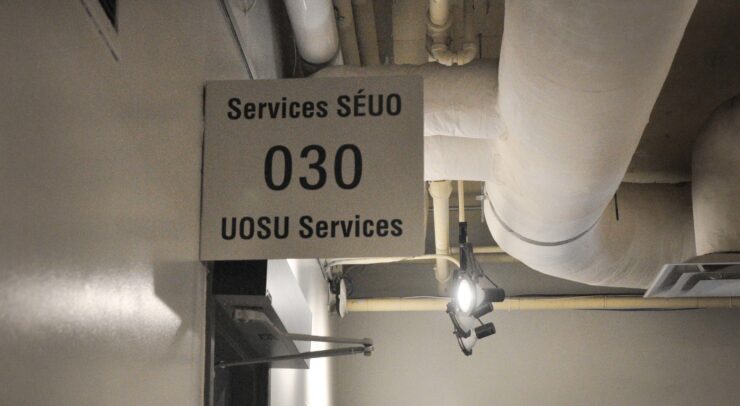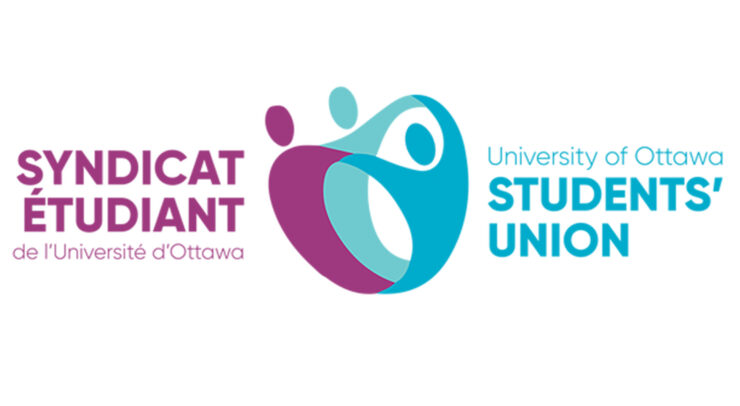Chief electoral officer, bilingual elections officer resigned due to concerns over their previous work as UOSU co-founders
With the resignation of Tiyana Maharaj as chief electoral officer (CEO) of the University of Ottawa Students’ Union’s (UOSU) general elections, the union’s elections committee would need to fill the position at least a week before their scheduled town hall debate on March 23 in order for the process to run smoothly, according to temporary chair of the elections committee Nicholas Morin.
“One of the things that may not happen this year, because of the lack of a CEO, we might not have the town hall for the debate with the executives,” said Morin, a first-year software engineering student and UOSU board member. “That’s why — even though I saw the rule and I understand the concern — I would rather have kept Tiyana on to make sure that we can run these elections properly.”
In a letter sent to the UOSU’s Board of Directors (BOD) on Tuesday, both Maharaj and bilingual elections officer Francesco MacAllister-Caruso resigned due to what they described as circulating concerns from board members and employees over their former work as co-founders of the union.
As outlined in the UOSU’s constitution, “no person who is or has previously been employed or otherwise remunerated by the UOSU, or by a business or service centre thereof, may serve as chief electoral officer.”
Maharaj and MacAllister-Caruso were among the team that spearheaded the development of the UOSU in the 2018-19 academic year after the administration terminated its agreement with the school’s former undergraduate union, the Student Federation of the University of Ottawa (SFUO), in the wake of fraud allegations against student leaders.
In their termination decision, the administration also cited allegations of improper governance, mismanagement, internal conflict and workplace misconduct in the SFUO.
Maharaj and MacAllister-Caruso finished their work with the union at the end of May 2019 after the current executive committee was elected and put in place. They did not run for executive positions.
“We are saddened to leave our positions just as the campaign period is set to begin next Monday, but we felt it to be the only appropriate measure moving forward to ensure the integrity of the electoral process and to retain the confidence of the board,” Maharaj and MacAllister-Caruso wrote.
Morin, who has been tasked with handling the CEO’s responsibilities in the meantime, said that he was surprised by Maharaj and MacAllister-Caruso’s decision to resign.
“At the same time, I understand. There’s a lot of pressure from members of the board and the executives,” said Morin. “I would have defended (Maharaj) because I don’t believe we should fire the CEO … it’s just going to make the election harder.”
It was because of Maharaj and MacAllister-Caruso’s role in helping to develop the UOSU that they were hired in late February after the former CEO was let go, according to Morin.
“I’m in first year. I wasn’t aware they were hired for the transition committee,” he said. “During that moment of hiring, to me, it was like, ‘OK, these guys were CEO before and they can do it again. Awesome.’ ”
In their letter, Maharaj and MacAllister-Caruso also cited the “incredible amount of work” that needed to be done for the election process to run smoothly in their decision to take the jobs, including the need to revise and shift the electoral timeline, book rooms and equipment, develop promotional material, and hold bilingual language testing.
Maharaj and MacAllister-Caruso also outlined four recommendations that the BOD and elections committee implement to help refine the electoral process and prevent similar issues going forward.
In the event that the elections committee does not hire a CEO in time, Morin said that the bare minimum would be put in place in order for the elections to happen.
“There would be no polling stations physically in place at the U of O, and all the voting would be done online, which is not ideal,” he said. “If we don’t have a full-time person working on it, then we can’t hire the people to work at the polling station. In that case, there would be no town hall because there’d be nobody to organize it.”
The timetable of the voting period for the general elections — which runs from March 25 to 27 — may have to be shifted, depending on if the committee is able to find a CEO or not, said Morin.
“One of the members of the elections committee found someone that we can probably get to be CEO, so I’ll get to talk to them tonight or tomorrow,” Morin said Tuesday afternoon. “That burden won’t be on my shoulders for too long.”
“If it remains on my shoulders, then there absolutely will not be a town hall, because I can’t organize that.”
Board member Tim Gulliver, who’s running for the advocacy commissioner position in the general elections, said that he’s seriously concerned with how elections are being conducted.
“Without assigning blame, there is clearly a large organizational issue and I hope that the outgoing CEO’s recommendations will be implemented in order to ensure that this doesn’t happen again,” Gulliver wrote in a message to the Fulcrum. “Students expect better than constant in-fighting and I think that’s the sentiment that most candidates share.”
Read More:
- UOSU’s chief electoral officer, bilingual elections officer resign
- UOSU advocacy commissioner resigns, citing concerns over appointment of former SFUO manager
- UOSU execs respond to advocacy commissioner’s resignation after appointment of former SFUO manager





